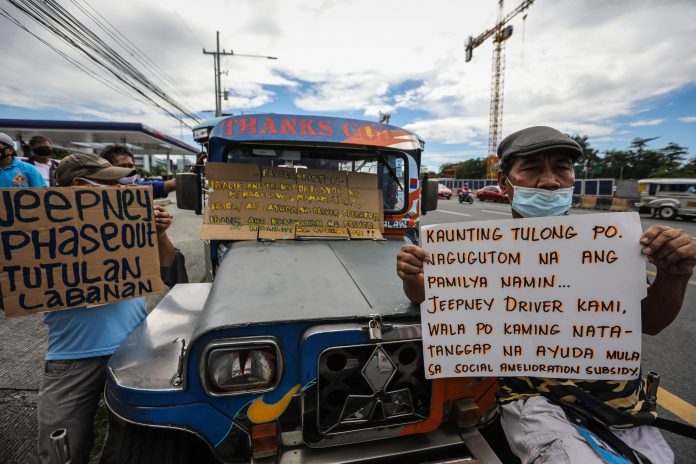WILL the national government take pity on the 55,000 jeepney drivers in Metro Manila now banned from plying their trade while the city is still under lockdown?
The drivers really hope so, now that the restrictions under the general community quarantine in the National Capital Region may be relaxed starting June 16.
Early this month, the Church People-Workers Solidarity urged the government to lift the restrictions on public transportation to ease the problem of the commuting public.
The group asserted that the resumption of jeepney operations would help jeepney and bus drivers and operators to earn their keep and survive difficult economic circumstances under the lockdown.
They deserve to be heard by the government.
Jeepneys—an adaptation of World War II-era military jeeps—have been a permanent fixture in both city and rural areas as a reliable and affordable mode of public transportation.
But the government has prohibited them from running as their configuration—passengers sitting close next to each other in two benches facing sideways—is hardly conducive to social distancing, a key measure to prevent the spread of the coronavirus.
Hence, jeepney drivers are probably the most adversely affected in the transport sector as they have not earned any income for the past three months. A number of them complained that they did not receive cash assistance under the national government’s social amelioration program. for one reason or another, prompting them to literally beg in the streets so they can keep body and soul together.
A group of jeepney drivers in Caloocan City, desperate to earn income so they can feed their families, mounted a peaceful protest action to call attention to their plight, but were promptly arrested detained by the police. They have all been released after posting bail and spending nearly a week in jail, but they will have to face the charge of allegedly resisting arrest and violating restrictions on mass gatherings.
The government has allowed just about all types of vehicles on city streets, except the jeepneys, a mainstay of the public transport system in the Philippines, and the lockdown is hurting jeepney drivers the most.
The ban on jeepney operations is also proving to be a big burden on the public, especially workers who have to wake up very early just so they can catch the few buses and light railway trains allowed to operate.
The result is that many workers cannot find public transportation, and they have to compete with thousands of other commuters. Some decide to just go home and forego earning a day’s income under the “no-work, no-pay policy” of small business enterprises, others opt to walk for hours to their places of work.
The latest survey by the Social Weather Stations showed that restrictions on public transportation due to the coronavirus lockdown have burdened most Filipinos.
The survey, conducted from May 4 to 10, showed that 77 percent of the total 4,010 respondents found the suspension “burdensome.”
About 40 percent of the respondents said they had “great difficulty” while 37 percent answered, “some difficulty” with the suspension of mass transportation.
Only 14 percent said that they had a “little difficulty” and eight percent said the suspension did not affect them at all. These, we presume, had their own private vehicles.
Despite the clamor of operators and drivers of public utility vehicles for them to be allowed back on the streets, the government has reaffirmed its decision to maintain the ban on most public transportation as preventive measures against the spread of Covid-19.
While the presidential spokesman said the government has “heard the sentiments and understand” the predicament of workers who commute, he reiterated that for now, authorities “still cannot let all modes of transportation to be on the streets” as this “will defeat the purpose of quarantine… Unless a vaccine or cure is available, we must not let our guard down.”
The restrictions imposed by the government on the public transport sector may be understandable amid the pandemic, but we believe the government should also consider that the ongoing ban on the operations of public utility vehicles such as jeepneys and buses defeats the purpose of promoting business activity and accelerating economic recovery. Besides, we think the government should demonstrate compassion and understanding for the dire situation of jeepney and bus drivers and their families, who are poor and disadvantaged to begin with, and need all the help they can get.
We cannot possibly lead the poor and disadvantaged sectors in our society to a better place by letting them starve and beg in the streets for sheer survival.
Ernesto M. Hilario writes on political and social justice issues for various publications in the Philippines. The views and opinions expressed in this article are those of the author and do not necessarily reflect the official editorial position of LiCAS.news.









